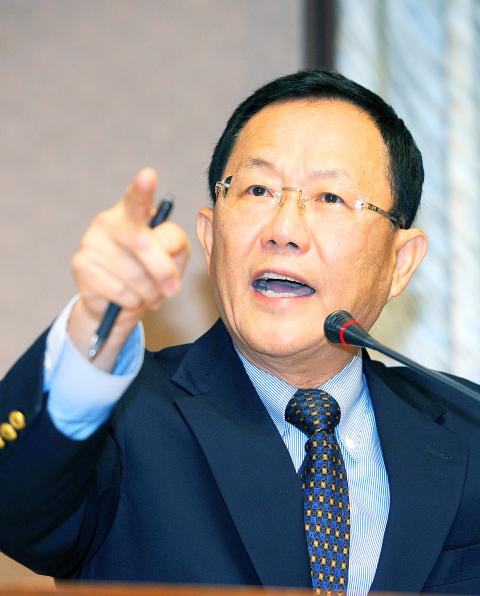Chinese Nationalist Party (KMT) Legislator Ting Shou-chung (丁守中) yesterday announced that he intends to run for the office of the mayor of Taipei in 2014. Ting, who competed in the KMT’s primary for Taipei mayor in 2006, said he had followed the party’s rules in the past when seeking his nomination for the post.
“Unfortunately, the party had other people in mind,” the veteran lawmaker said.
Ting added that his campaign platform will focus on “major urban renewal, urban aesthetics and Taipei’s competitiveness.”

Photo: Fang Pin-chao, Taipei Times
The municipal elections are considered mid-term elections in Taiwan.
Taipei — which has a population of 2.67 million — is viewed as a key indicator used to gauge the chances political parties have of winning the presidential election — set to be held in 2016.
The KMT has dominated Taipei’s mayoral elections since 1998 when the city’s second direct poll took place. Former president Chen Shui-bian (陳水扁) of the Democratic Progressive Party won the first race in 1994.
However, Ting is not among the forerunners according to media speculation, with Vice Premier Jiang Yi-huah (江宜樺) reported to enjoy the support of the KMT’s higher echelons.
Sean Lien (連勝文), one of the sons of former vice president Lien Chan (連戰), has also been reported as a mayoral hopeful. However, neither Jiang nor Sean Lien have announced their candidacy. Meanwhile, Ting’s colleague, KMT Legislator Alex Tsai (蔡正元), yesterday said he is “still considering” whether to compete.
Commenting on Ting’s announcement, Su Jun-pin (蘇俊賓), the KMT’s Organizational Development Committee director, said “we welcome all” party members to compete for nomination in the 2014 seven-in-one local elections. KMT Taipei Councilor Yang Shih-chiu (楊實秋) said in June that he also plans to throw his hat into the mayoral ring.

Civil society groups yesterday protested outside the Legislative Yuan, decrying Chinese Nationalist Party (KMT) efforts to pass three major bills that they said would seriously harm Taiwan’s democracy, and called to oust KMT caucus whip Fu Kun-chi (傅?萁). It was the second night of the three-day “Bluebird wintertime action” protests in Taipei, with organizers announcing that 8,000 people attended. Organized by Taiwan Citizen Front, the Economic Democracy Union (EDU) and a coalition of civil groups, about 6,000 people began a demonstration in front of KMT party headquarters in Taipei on Wednesday, organizers said. For the third day, the organizers asked people to assemble

POOR IMPLEMENTATION: Teachers welcomed the suspension, saying that the scheme disrupted school schedules, quality of learning and the milk market A policy to offer free milk to all school-age children nationwide is to be suspended next year due to multiple problems arising from implementation of the policy, the Executive Yuan announced yesterday. The policy was designed to increase the calcium intake of school-age children in Taiwan by drinking milk, as more than 80 percent drink less than 240ml per day. The recommended amount is 480ml. It was also implemented to help Taiwanese dairy farmers counter competition from fresh milk produced in New Zealand, which is to be imported to Taiwan tariff-free next year when the Agreement Between New Zealand and

A woman who allegedly spiked the food and drinks of an Australian man with rat poison, leaving him in intensive care, has been charged with attempted murder, the Taipei District Prosecutors’ Office said yesterday. The woman, identified by her surname Yang (楊), is accused of repeatedly poisoning Alex Shorey over the course of several months last year to prevent the Australian man from leaving Taiwan, prosecutors said in a statement. Shorey was evacuated back to Australia on May 3 last year after being admitted to intensive care in Taiwan. According to prosecutors, Yang put bromadiolone, a rodenticide that prevents blood from

A Japanese space rocket carrying a Taiwanese satellite blasted off yesterday, but was later seen spiraling downward in the distance as the company said the launch attempt had failed. It was the second attempt by the Japanese start-up Space One to become the country’s first private firm to put a satellite into orbit, after its first try in March ended in a mid-air explosion. This time, its solid-fuel Kairos rocket had been carrying five satellites, including one from the Taiwan Space Agency and others designed by Japanese students and corporate ventures. Spectators gathered near the company’s coastal Spaceport Kii launch pad in Japan’s